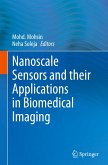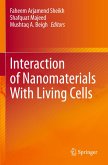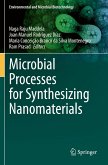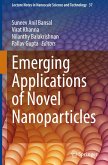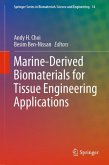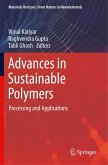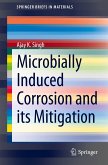Recent Advances in Nanotechnology
Select Proceedings of ICNOC 2022
Herausgegeben:Khan, Zishan Husain; Jackson, Mark; Salah, Numan A.
Recent Advances in Nanotechnology
Select Proceedings of ICNOC 2022
Herausgegeben:Khan, Zishan Husain; Jackson, Mark; Salah, Numan A.
- Broschiertes Buch
- Merkliste
- Auf die Merkliste
- Bewerten Bewerten
- Teilen
- Produkt teilen
- Produkterinnerung
- Produkterinnerung
This volume comprises the select peer-reviewed proceedings of the International Conference on Nanotechnology: Opportunities and Challenges (ICNOC22). It aims to provide a comprehensive and broad-spectrum picture of the state-of-the-art research and development in nanomaterials, nanocomposites, nanobiosensors, nanochemistry, renewable energy, nanochemistry in medicine, batteries and supercapacitors, targeted cellular therapies, among others. This volume will be useful for researchers and professionals working in nanotechnology and allied fields.
Andere Kunden interessierten sich auch für
![Nanoscale Sensors and their Applications in Biomedical Imaging Nanoscale Sensors and their Applications in Biomedical Imaging]() Nanoscale Sensors and their Applications in Biomedical Imaging139,99 €
Nanoscale Sensors and their Applications in Biomedical Imaging139,99 €![Interaction of Nanomaterials With Living Cells Interaction of Nanomaterials With Living Cells]() Interaction of Nanomaterials With Living Cells194,99 €
Interaction of Nanomaterials With Living Cells194,99 €![Microbial Processes for Synthesizing Nanomaterials Microbial Processes for Synthesizing Nanomaterials]() Microbial Processes for Synthesizing Nanomaterials154,99 €
Microbial Processes for Synthesizing Nanomaterials154,99 €![Emerging Applications of Novel Nanoparticles Emerging Applications of Novel Nanoparticles]() Emerging Applications of Novel Nanoparticles139,99 €
Emerging Applications of Novel Nanoparticles139,99 €![Marine-Derived Biomaterials for Tissue Engineering Applications Marine-Derived Biomaterials for Tissue Engineering Applications]() Marine-Derived Biomaterials for Tissue Engineering Applications108,99 €
Marine-Derived Biomaterials for Tissue Engineering Applications108,99 €![Advances in Sustainable Polymers Advances in Sustainable Polymers]() Advances in Sustainable Polymers123,99 €
Advances in Sustainable Polymers123,99 €![Microbially Induced Corrosion and its Mitigation Microbially Induced Corrosion and its Mitigation]() Ajay K. SinghMicrobially Induced Corrosion and its Mitigation47,99 €
Ajay K. SinghMicrobially Induced Corrosion and its Mitigation47,99 €-
-
-
This volume comprises the select peer-reviewed proceedings of the International Conference on Nanotechnology: Opportunities and Challenges (ICNOC22). It aims to provide a comprehensive and broad-spectrum picture of the state-of-the-art research and development in nanomaterials, nanocomposites, nanobiosensors, nanochemistry, renewable energy, nanochemistry in medicine, batteries and supercapacitors, targeted cellular therapies, among others. This volume will be useful for researchers and professionals working in nanotechnology and allied fields.
Produktdetails
- Produktdetails
- Springer Proceedings in Materials 28
- Verlag: Springer / Springer Nature Singapore / Springer, Berlin
- Artikelnr. des Verlages: 978-981-99-4687-7
- 2023
- Seitenzahl: 632
- Erscheinungstermin: 9. September 2024
- Englisch
- Abmessung: 235mm x 155mm x 32mm
- Gewicht: 1058g
- ISBN-13: 9789819946877
- ISBN-10: 9819946875
- Artikelnr.: 71530526
- Herstellerkennzeichnung Die Herstellerinformationen sind derzeit nicht verfügbar.
- Springer Proceedings in Materials 28
- Verlag: Springer / Springer Nature Singapore / Springer, Berlin
- Artikelnr. des Verlages: 978-981-99-4687-7
- 2023
- Seitenzahl: 632
- Erscheinungstermin: 9. September 2024
- Englisch
- Abmessung: 235mm x 155mm x 32mm
- Gewicht: 1058g
- ISBN-13: 9789819946877
- ISBN-10: 9819946875
- Artikelnr.: 71530526
- Herstellerkennzeichnung Die Herstellerinformationen sind derzeit nicht verfügbar.
Dr. Zishan Husain Khan is currently a Professor and Head of the Department of Applied Sciences and Humanities, Faculty of Engineering and Technology, Jamia Millia Islamia, New Delhi, India. He obtained his Ph.D. degree from Jamia Millia Islamia, India. He has almost 25 years of research experience in semiconductor physics and nanotechnology. He has published more than 150 research papers in various international reputed journals and guided a number of Ph.D. students. He was a post-doctoral fellow at the Department of Materials Science & Engineering & Centre of Nanoscience and Nanotechnology National Tsing Hua University, Hsinchu, Taiwan from 2001 to 2005. During his postdoctoral research, his work on the fabrication of FET (field effect transistor) using individual (single) carbon nanotube was highly appreciated by the scientific community. His present research interests include hybrid solar cells, OLEDs, transition metals di-chalcogenides, carbonaceous nanomaterials, nano-sensors, and nano-bio sensors. Dr. Mark James Jackson is the McCune and Middlekauff Endowed Professor and University Faculty Fellow at Kansas State University, USA. He studied a degree in mechanical and manufacturing engineering at Liverpool Polytechnic. After graduating with the Master of Engineering (M.Eng.) degree with distinction, Dr. Jackson subsequently conducted research for his Ph.D. degree at Liverpool Polytechnic in the field of materials engineering focusing primarily on microstructure-property relationships in vitreous bonded abrasive materials. Dr. Jackson was a research fellow at the Cavendish Laboratory, University of Cambridge, working with Professor John Field, O.B.E., F.R.S., and Professor David Tabor, F.R.S., on condensed matter physics and tribology before becoming a lecturer in engineering at the University of Liverpool in 1998. At Liverpool, he attracted a number of research grants concerned with developing innovative manufacturing processesfor which he was jointly awarded an Innovative Manufacturing Technology Centre from the Engineering and Physical Sciences Research Council in November 2001. Dr. Jackson was appointed a member of the United Nations Education, Scientific, and Cultural Organization's (UNESCO) International Commission for the Development of the 'Encyclopaedia of Life Support Systems' Theme on 'Nanoscience and Nanotechnologies', and still serves in this capacity. In March 2017, the degree of Doctor of Science (D. Sc.) in mechanical engineering was conferred upon Dr. Jackson in absentia by the congregation for sustained contributions made in the area of mechanical engineering and advanced manufacturing over a period of twenty years. Prof. Numan Abdullah Salah is currently working at the Center of Nanotechnology & Department of Nuclear Engineering, King Abdulaziz University, Saudi Arabia. He obtained his B.Sc. (Physics) from Baghdad University, Iraq, and M.Sc. (Physics) from Jawaharlal Nehru University (JNU), New Delhi, and his Ph.D. in Physics at the University of Delhi, India. He had also worked as a postdoctoral research fellow at the Inter-University Accelerator Center (IUAC), New Delhi. His major areas of research interests include nanomaterials and their use in dosimetry, water, and energy applications. He has published/ granted more than 10 US patents. He has published 153 research papers in respected international journals/ conferences.
Design of Hetero-Dielectric Single Metal Gate All Around MOSFET with Schottky Contact Source/Drain.- Device Study and Optimization of Perovskite/CuSCN Based Solar Cell with SnO2 Electron Transport Layer Using SCAPS 1-D.- Metal/Polymeric Hierarchical Platform as Biosensor.- Inexpensive Fabrication of Visible Dielectric Reflector for Improving the Performance of Visible Light Communication.- Controllable Fast and Slow Light an a Quadratically Coupled Optomechanical System Assisted by Quantum Dot Molecules.- Performance Analysis of NiO/Ch3Nh3GeI3/SnO2 Perov-skite Solar Cell Using SCAPS 1D.- Analog/RF Performance Comparison of SOI and SELBOX FinFET with Uniform and Non-uniform Doping Profile at 7nm Technology Node.- Enhanced Biodiesel Production from Waste Cooking Oil Using ZnO Nanocatalyst.- Energy Conservation in the Vapour Compression Refrigeration System Using Nanorefrigerant.- Global Research Trends on Nanohydroxyapatite Use in Dentistry- A Bibliometric Analysis.- Facile Synthesis ofHighly Flourescent N-CQDs and its Application for Dye Degradation and Sensing of Cr3+.
Design of Hetero-Dielectric Single Metal Gate All Around MOSFET with Schottky Contact Source/Drain.- Device Study and Optimization of Perovskite/CuSCN Based Solar Cell with SnO2 Electron Transport Layer Using SCAPS 1-D.- Metal/Polymeric Hierarchical Platform as Biosensor.- Inexpensive Fabrication of Visible Dielectric Reflector for Improving the Performance of Visible Light Communication.- Controllable Fast and Slow Light an a Quadratically Coupled Optomechanical System Assisted by Quantum Dot Molecules.- Performance Analysis of NiO/Ch3Nh3GeI3/SnO2 Perov-skite Solar Cell Using SCAPS 1D.- Analog/RF Performance Comparison of SOI and SELBOX FinFET with Uniform and Non-uniform Doping Profile at 7nm Technology Node.- Enhanced Biodiesel Production from Waste Cooking Oil Using ZnO Nanocatalyst.- Energy Conservation in the Vapour Compression Refrigeration System Using Nanorefrigerant.- Global Research Trends on Nanohydroxyapatite Use in Dentistry- A Bibliometric Analysis.- Facile Synthesis ofHighly Flourescent N-CQDs and its Application for Dye Degradation and Sensing of Cr3+.


